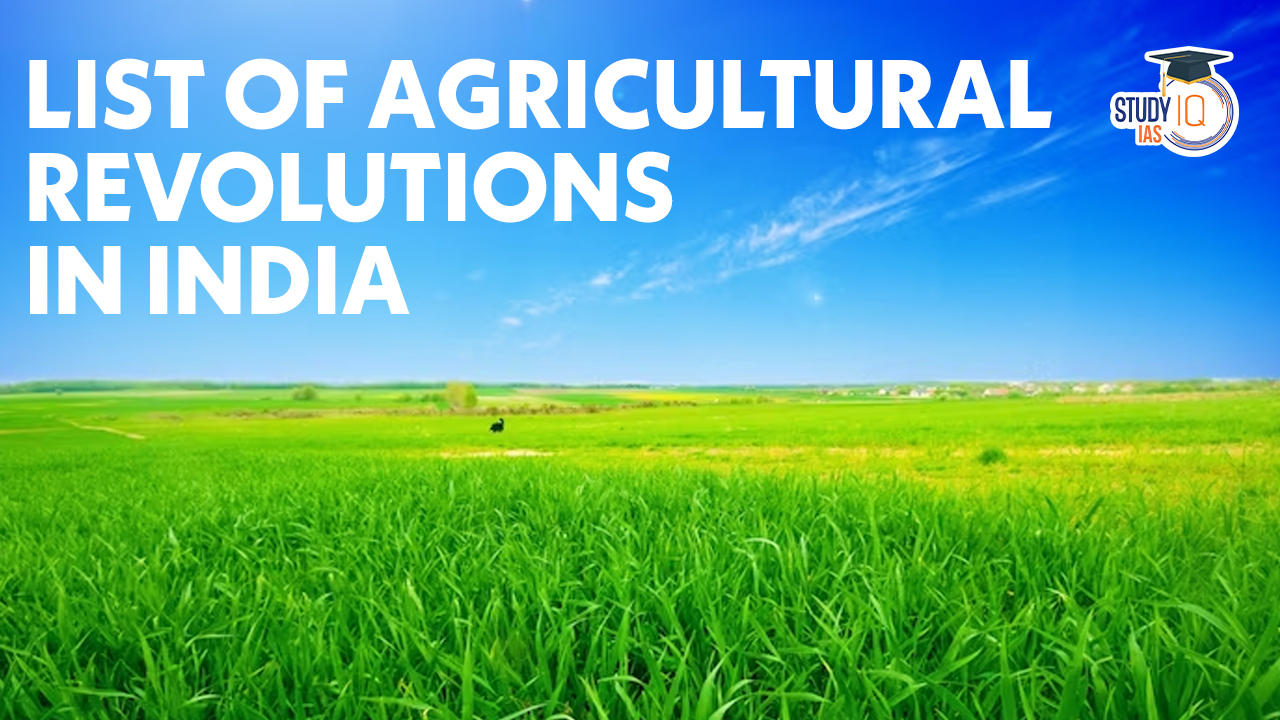Table of Contents
Agriculture Revolutions in India
Throughout India’s history, there have been big changes in how we farm. These changes are like turning points and are called agricultural revolutions. They show how Indian farmers can adapt and come up with new ideas. These times of change mix old and new ways of farming, making a picture of how we feed our nation. Let’s take a trip through time to see these different agricultural revolutions in India. Each change is like a special thread that adds to the story of how we farm.
An agricultural revolution is when farming changes a lot in a short time. New tools, ideas, or ways of growing crops make farming better and help more people get enough food. It’s like a big shift that makes farming easier and helps the country grow more food.
List of Agriculture Revolutions in India From 1960 to 2023
Here is a comprehensive list of Agriculture Revolutions in India covering along with various aspects.
| S.No | Name | Pioneer of the Revolution | Main Focus and Objective | When Started | Achievements | Challenges that Remain |
| 1 | Green Revolution | M.S. Swaminathan | Food Grains Production | 1960s | Boosted food grain yields | Sustainable water and land use |
| 2 | White Revolution | Verghese Kurien | Milk Production | 1970s | Higher milk production | Ensuring fair returns for dairy farmers |
| 3 | Blue Revolution | Dr Arun Krishnan | Fish Production | 1970s | Increased fish production | Overfishing and coastal habitat degradation |
| 4 | Yellow Revolution | Sam Pitroda | Oilseed Production, Mustard & Sunflower | Late 1980s | Boosted oilseed production | Enhancing productivity sustainably |
| 5 | Silver Revolution | Indira Gandhi | Egg Production, Poultry Production | 1980s | Expansion of egg and poultry industries | Disease management and animal welfare |
| 6 | Grey Revolution | – | Fertilizers | 1970s | Increased fertilizer usage | Balancing chemical use and soil health |
| 7 | Pink Revolution | Durgesh Patel | Onion, Pharmaceuticals, Prawn Production | 1990s | Improved production in respective areas | Quality control and market fluctuations |
| 8 | Brown Revolution | – | Leather, Cocoa, Non-Conventional Products | – | Diversified agricultural products | Ensuring sustainability and ethical practices |
| 9 | Round Revolution | – | Potato Production | 1990s | Growth in potato cultivation | Storage and distribution challenges |
| 10 | Golden Revolution | Nirpakh Tutej | Fruits, Honey, Horticulture Development | 1990s | Growth in horticultural products | Post-harvest losses and supply chain issues |
| 11 | Protein Revolution | Coined by Narendra Modi and Arun Jaitley | Higher Production through Technology | Coined (2020) | Increased food production | Ensuring equitable access to technology |
| 12 | Silver Fiber Revolution | – | Cotton Production | – | Enhanced cotton yield and quality | Pest resistance and sustainability |
| 13 | Red Revolution | Vishal Tewari | Meat Production, Tomato Production | – | Increased meat and tomato production | Quality assurance and resource use |
| 14 | Black Revolution | – | Petroleum Product Production | – | Reduced dependency on imports | Managing environmental impacts |
| 15 | Evergreen Revolution | – | Integration of ecological principles | – | Improved sustainability of agriculture | Spreading awareness and adoption |
| 16 | Golden Fiber Revolution | – | Jute Production | – | Enhanced jute production | Market competition and synthetic materials |
Agriculture Revolution in India: Important Points
Green Revolution
The main aim of the Green Revolution was to increase agricultural productivity in the developing world with the use of technology and agricultural research. The main focus was on transforming India into a modern industrial system through the adoption of technology, such as the use of high-yielding variety (HYV) seeds, mechanized farm tools, irrigation facilities, pesticides, and fertilizers.
Round Revolution
The potato revolution aimed to make the production of potatoes double or triple instead of a single annual increase.
Grey Revolution
This revolution was started in succession to the green revolution. It was started to correct the wrongs done in a green revolution.
Pink Revolution
The pink revolution denotes the technological revolution in the poultry and meat processing sector. The revolution includes the creation of meat testing facilities, cold storage for growth, and other infrastructure facilities.
White Revolution
The revolution was associated with a sharp increase in milk production in the country. The white revolution period aimed to make India a self-dependent nation in milk production.
Blue Revolution
Blue Revolution aims to create an enabling environment for the integrated development of the full potential of fisheries in the country. Blue Revolution also aims to substantially improve the income status of fishers and fish farmers keeping in view the sustainability, bio-security, and environmental concerns.
Yellow Revolution
Due to the yellow revolution, India became a net exporter of oilseeds from being a net importer. During the early 1990s, an all-time high of 25 million tonnes of oilseeds was produced from yearly oilseed harvests.
Protein Revolution
The protein revolution is a technology-driven 2nd Green revolution. Set up a Price Stabilization Fund with a corpus of Rs.500 crore to help farmers deal with volatility. A Kisan TV was started to provide real-time information on new techniques, water conservation, and organic farming.
Black Revolution
The Government of India planned to accelerate the production of ethanol and mix it up with petrol to produce biodiesel. The blending of ethanol with transport fuels can provide better returns to farmers, and supplement scarce and environment-friendly hydrocarbon resources.
Read about: Types of Rocks





















 WhatsApp
WhatsApp